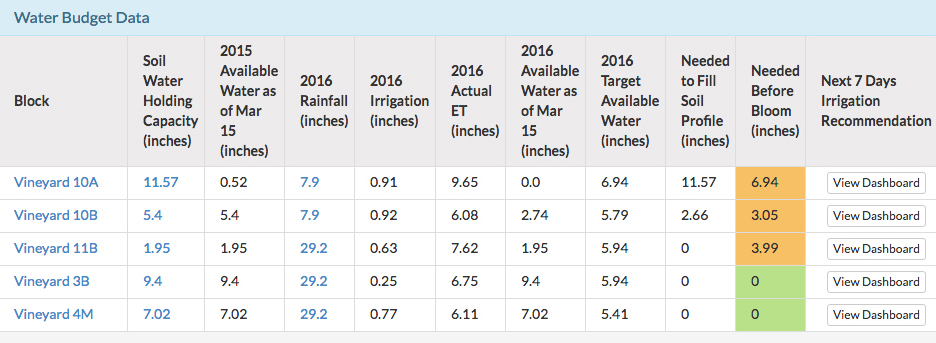We’ve heard from many growers that early season irrigation decisions can be some of the most difficult and the most critical. Tule’s spring water budget can help with these irrigation decisions if sensors are installed before cover crops are established and the rain season begins.
The report made me want more info. I only wish I had it on all of the blocks not just those where Tule was installed before October 1.
- Chris Storm
Viticulturist, VinoFarms
Here’s How it Works:
Tule uses a water budget approach to determine the site-specific irrigation needed before bloom. By measuring evapotranspiration (ET) of your cover crop over the winter season, Tule completes the missing link in the water budget calculation. Taking account of the inputs (rainfall and irrigation) and outputs (ET) in comparison to the soil water holding capacity, growers have greater insight into the available water before bloom. Tule's irrigation recommendations also consider the water that will be needed through bloom when providing the recommendation for quantity and timing of early season irrigations. This gives growers more confidence in their early season irrigation decisions.
Only if you have Tule sensors installed before the rainy season begins, will you be able to take advantage of site-specific insights like these:
We are looking forward to using the spring water budget in our almonds to determine how much water to apply before bloom if the winter rainfall is not sufficient. Having adequate soil moisture before bloom is essential for setting a good crop.
- James Nichols
Farm Technology Manager, Nichols Farms
For Almonds

For Winegrapes

As you can see, this information is critical for sites with low water holding capacities and/or little rainfall. To see more about how this was calculated, check out this blog post from early 2016.
Sensor quantities are limited for installation before October, so contact us to reserve your spot today. (Installations are typically scheduled 3-4 weeks after an order is completed.)

 By Team Tule, July 27, 2016
By Team Tule, July 27, 2016


